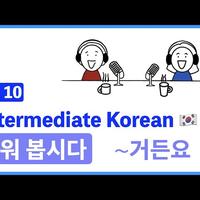[Intermediate Korean] EP. 10 배워 봅시다_~거든요
[Mittelstufe Koreanisch] EP. 10 Lass uns lernen_~ weil
[Intermediate Korean] EP. 10 Let's learn how to_~ because
[Coreano Intermedio] EP. 10 Vamos a aprender_~ porque
[Coréen intermédiaire] EP. 10 Let's learn_~ because
[Coreano intermédio] EP. 10 Vamos aprender_~ porque
[음악]
222
안녕하세요 여러분 힌트 이득이 안에
Hi guys hint gain is inside
잘하셨습니다 5
[음악]
안녕하세요 여러분 셈입니다 안녕하세요
Hello everyone, this is Sem.
몇 셈입니다 민 선생님 머리를 짧게 자르고 오셨네요
How much is it? Mr. Min came with a short haircut.
4 저는 머리가 길면 답답하고 거든요
4 I feel stuffy with long hair.
그러시군요 아 짧은 머리가 잘 어울리세요
고맙습니다 오늘은 일상에서 사용하는 유용한 표현을 배워보는 시간 이예요
Thank you. Today we're going to learn some useful expressions to use in everyday life.
인 선생님 오늘 준비 하신 표현을 소개해 주시겠어요
Ms. Yin, can you introduce the expressions you prepared today?
오늘은 거든요 라는 표현을 배워 볼 거예요
Today we're going to learn the expression guddenly.
今日は「ガーデニング」という表現を学んでみます。
아 우리가 대화할 때 자주 쓰는 표현 이네요
Oh, that's a phrase we use a lot in our conversations.
언제 이 표현을 사용하는 지 설명해 주시겠어요
Can you explain when you use this expression?
앞의 내용에 대한 이유나 사실을 설명하듯 말할 때 써요
Use it to state a reason or fact for something that preceded it.
그렇군요 그러고보니 앞에서 인 선생님이 이 표현을 사용하신 것 같아요
Okay. Now that you mention it, I think Ms. Yin used this expression earlier.
제가요 4 제가 오늘 머리를 짧게 자르고 오셨다고 하니까 민 선생님이
I said, "I cut my hair short today," and Ms. Min said.
머리가 길면 답답하다 고 하셨잖아요
그랬죠 그때 저는 머리가 되면 답답하고 든요 라고 하셨어요
그런거 같네요 너무 자연스러운 표현이 라서 의식하지 못했어요
I guess so. It's so natural that I didn't even realize it.
4 그 상황에서 는 머리를 짧게 자른 이유를 설명하는 것 같네요
4 In that situation, I guess that explains why you cut your hair short.
맞아요 그런데 여기서 한가지 기억하셔야 할게 있어요
Right, but there's one thing to remember here.
뭐지요 이 표현은 듣는 사람이 그 내용을 모를 거라고 생각할 때 사용해요
This is used when you don't think the listener will know what you're talking about.
아 그렇군요 그럼 이 표현을 어떻게 활용하는지 설명해 주시겠어요
Oh, I see, so can you explain how to use this expression?
동사나 형용사의 기본형 에서 달을 빼고 거든요 를 붙이면 되요
You can do this by subtracting the month from the base form of the verb or adjective and adding there or thereabouts.
동사를 먼저 해 볼까요
Let's try verbs first
가다 가거든요
먹다 먹거든요
문장으로 해볼게요 다음달에 한국에 하거든요
여러분 우리 같이 따라해 볼까요
다음 달에 한국의 가거든요
저는 매운 음식을 못 먹거든요
I can't eat spicy food
같이 따라해 볼까요
Let's follow along
저는 매운 음식을 못먹어 지녀 내에 여러분 잘 하셨어요
I can't eat spicy food, so you guys did a great job.
이번에는 형용사를 해볼까요
멋지다 멋지 거든요
Cool, cool, cool.
작다 자 거 든 요
small sleeping bag
문장으로 해볼게요 4 락사 늬 경치가 멋지 거든요
I'll try it with a sentence. 4 Laksa, the view must be nice.
같이 따라해 볼까요
설악산을 경치가 멋지 거든요
우리집 거실이 자 거 든 요 따라해 볼까요
우리집 거실이 자꾸 거 든요
정말 잘하셨어요 인 선생님 그럼 과거의 사실을 표현할 때는 어떻게 하지요
그때는 아 엇 다음에 거든요 를 드시는데요
4 해볼게요 찍었다
4 I'll try
찍었거든요
because I took it.
재미있었다 재미 있었거든요
It was fun. It was fun.
문장으로 해볼게요 지우 씨가 이번에 영화를 찍었거든요
Let me try it with a sentence. Mr. Jiu made a movie this time.
같이 따라해 볼까요 지호 씨가 이번에 영화를 찍어 꺼진 요
Shall we follow along? Jiho was filmed this time and turned off
그 드라마가 정말 재미 있었거든요
따라해 볼까요 그 드라마가 정말 재미 있었거든요
청취자 여러분 어렵지 않죠
내 그럼 여기서 이 표현이 들어간 대화를 들어 볼까요
네 좋아요
[음악]
수영 씩 이번주 토요일에 시간 있어요
I'm free this Saturday for swimming.
네 괜찮아요 그래요
Yeah, that's fine. Okay.
저녁에 집들이를 하거든요
I'm having a housewarming party in the evening.
집들이 요 지 우 씨 이사가 싸요
Mr. Jiu's housewarming party is cheap
배 집을 구하고 있었는데 학교 앞에 괜찮은 집이 나왔거든요
I was looking for a boat house and there was a nice one in front of the school.
[음악]
[Music].
지호 씨가 수영 씨에게 토요일에 시간이 있는지를 묻습니다
수영 씨가 이유를 묻자 집들이를 한다고 하네요
When Sooyoung asks why, they say they are holding a housewarming party.
수영 씨가 모르는 정보를 알려주면서 이유를 설명하죠
Sooyoung gives information that she doesn't know and explains why.
그래서 집들이를 하거든요 라는 표현을 쓰는 거 거요
That's why I'm using the expression "I'm doing housewarming."
4 수영 씨가 놀라서 지 오 씨에게 이삭 않느냐 고 묻자 지우 씨는
4 Mr. Sooyoung was surprised and asked Mr. Ji-o if he had a grain, and Mr. Ji-woo answered.
괜찮은 집이 나왔거든요
I got a nice house.
라면서 설명 아들 대답을 합니다
and answer the explanation son
여러분 오늘 우리는 거든요 라는 표현을 배워 봤어요
Everyone, today we learned the expression
상대방이 모르는 이유나 사실을 설명하듯 말할 때 쓰는 표현이에요
This is an expression used to explain a reason or fact that the other person does not know.
동사나 형용사의 기본형 에서 달을 빼고
Subtract the month from the basic form of a verb or adjective
거든요 를 붙이면 돼요 여러분도 누군가에게 질문을 받을 때 또는 새로운
You can add because
정보를 설명하듯 말할 때 이 표현을 써 보세요 아주 자연스러워 보일
Use this expression to describe information. It will look very natural.
거예요 그럼 저희는 다음 시간에 유용한 표현을 들고 다시 찾아뵙겠습니다
Well, we'll see you next time with useful expressions.
아니세요
[음악]
[음악]
[음악]

